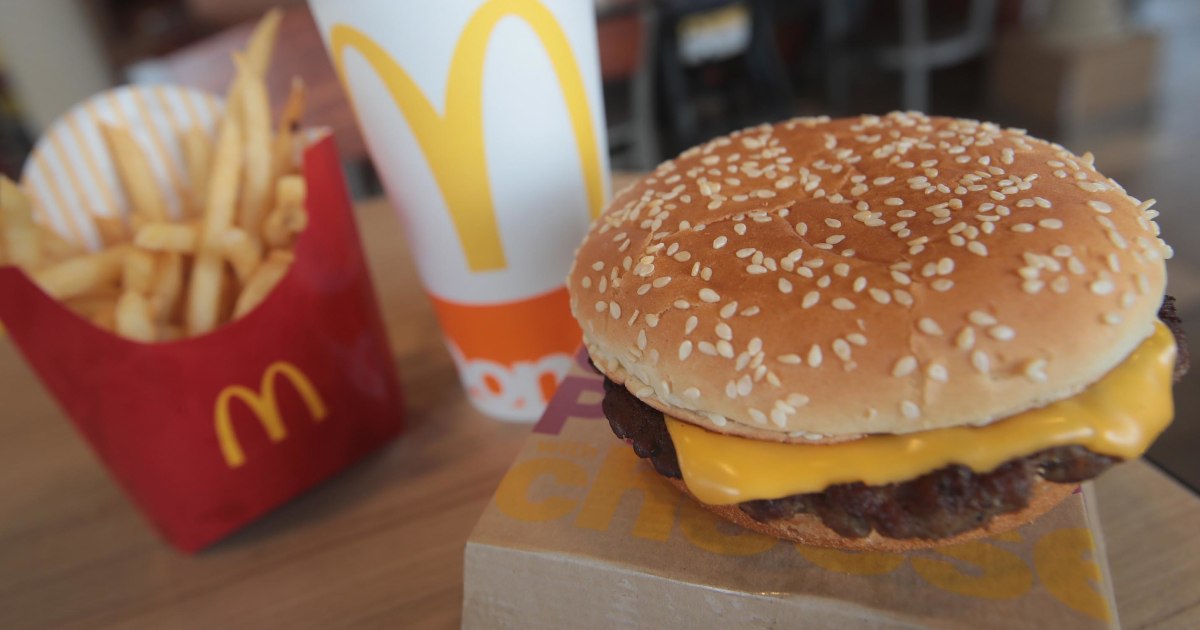The Centers for Disease Control and Prevention launched an investigation after multiple people have reportedly fallen ill from eating McDonald’s Quarter Pounder hamburgers.
On Tuesday, Oct. 22, the CDC posted a food safety alert on its website confirming that it is investigating an E. coli outbreak linked to McDonald’s Quarter Pounders across 10 states. The CDC described the outbreak as “severe” in a press release issued the same day.
McDonald’s Quarter Pounders will temporarily be unavailable for purchase in some states, the CDC said, as those who have been infected reported eating the burgers before becoming sick.
So far, there have been 49 reported cases and 10 hospitalizations. There has also been one reported death, the CDC said.
Read on for more information about the recent outbreak.
McDonald’s E. coli Outbreak 2024
The CDC shared an alert on its website Oct. 22 confirming that there is an investigation involving a recent E. coli outbreak tied to McDonald’s Quarter Pounder hamburgers.
Investigators have yet to determine which food ingredient on the McDonald’s menu item is contaminated and have pulled ingredients used in Quarter Pounders. The CDC said the burgers will not be available to buy in states affected by the outbreak.
McDonald’s is working with investigators to find the ingredient that caused the outbreak.
“McDonald’s stopped using fresh slivered onions and quarter pound beef patties in several states while the investigation is ongoing to identify the ingredient causing illness,” the CDC said.
The fast-food chain also released a statement Oct. 22 addressing the contamination, describing the response as “swift and decisive.”
“The initial findings from the investigation indicate that a subset of illnesses may be linked to slivered onions used in the Quarter Pounder and sourced by a single supplier that serves three distribution centers. As a result, and in line with our safety protocols, all local restaurants have been instructed to remove this product from their supply and we have paused the distribution of all slivered onions in the impacted area,” McDonald’s said, in part.
“We take food safety extremely seriously and it’s the right thing to do,” the company added.
McDonald’s said that other popular items that contain beef — like the Cheeseburger, Hamburger, Big Mac, McDouble and the Double Cheeseburger — will remain on the menu and are “unaffected.”
“We will continue to work with the Centers for Disease Control and Prevention (CDC) and are committed to providing timely updates as we restore our full menu,” the statement concluded.
CDC investigating outbreak
The CDC has reported that 49 people have been affected by the outbreak.
“This outbreak may not be limited to the states with known illnesses, and the true number of sick people is likely much higher than the number reported,” the CDC cautioned.
Ten people have been hospitalized and there has been one reported death.
What states are affected by the outbreak?
The 10 states currently affected by the E. coli outbreak are Oregon, Utah, Montana, Wyoming, Colorado, Nebraska, Kansas, Iowa, Missouri and Wisconsin.
Colorado has the most reported cases, according to the CDC’s website. It is also where one person died as a result of the outbreak.
In McDonald’s statement, the fast-food chain noted that parts of Idaho, Nevada, New Mexico and Oklahoma have also been impacted.
E. Coli symptoms
According to the CDC, those who have been infected with E. coli might experience symptoms like intense stomach cramps, possibly bloody diarrhea and vomiting. Some could also suffer from serious kidney problems, leading to hospitalization.
The center said the symptoms typically begin three to four days after swallowing the bacteria and that recovery could take five to seven days.
The CDC cautioned those who have eaten a McDonald’s Quarter Pounder and have diarrhea and a fever higher than 102°F after more than three days to contact a healthcare provider.
Vomiting and signs of being dehydrated, like a lack of urination, dry mouth and throat and dizziness upon standing, are also signs to seek medical attention.

